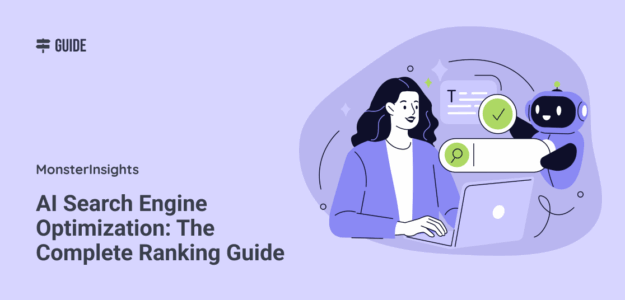Your website might be invisible to the fastest-growing search engines on the internet. While you’ve been optimizing for Google’s traditional search, AI-powered search engines and features like ChatGPT, AI Overviews, and Perplexity are reshaping how people find information online.
The shift is happening faster than most website owners realize. The global AI search engines market is expected to reach $108.88 billion by 2032, exhibiting a compound annual growth rate (CAGR) of 14% from 2025 to 2032.
Meanwhile, 13.14% of all queries triggered AI Overviews in March 2025, up from 6.49% in January 2025.
This means millions of searches are now answered by AI systems that might never send visitors to your website. But here’s the good news: you can optimize your content to rank in these AI-powered results and capture this valuable traffic.
In this guide, I’ll show you exactly how to optimize your website for AI search engines. You’ll learn the proven strategies that help content appear in AI Overviews, ChatGPT results, and other AI-powered search features.
Table of Contents:
What is AI Search Engine Optimization?
AI Search Engine Optimization (AI SEO) is the practice of optimizing your website and content to rank in AI-powered search results. This includes Google’s AI Overviews, ChatGPT search results, Perplexity answers, and other AI-driven search features.
Unlike traditional SEO, which focuses on ranking in blue links, AI SEO optimizes for systems that use your content to generate answers, summaries, and recommendations.
The key difference is that AI search engines don’t just index your content—they understand it, synthesize it, and use it to create new responses for users.
Here’s what AI SEO involves:
- Content structuring for AI comprehension
- Schema markup implementation
- Technical optimization for AI crawlers
- Authority building for AI trust signals
- Featured snippet optimization
- Voice search optimization
Why AI SEO Matters for Your Website
I’ve been tracking AI search trends since 2023, and the numbers are staggering. ChatGPT topped 3 billion visits in September 2024, and a September 2024 survey revealed that 8% of U.S. respondents now use ChatGPT as their primary search engine, up from 1% in June.
Pro Tip: Start optimizing for AI search now while competition is still relatively low. The websites that get featured early will have a significant advantage as AI search adoption grows.
Here’s why AI SEO should be a priority for your website:
1. Growing Market Share
The number of AI-powered voice assistants in use worldwide is projected to reach 8.4 billion, surpassing the global population. This means more people are getting answers from AI systems instead of traditional search results.
2. Higher Engagement Rates
Research shows that AI-generated search results often provide more detailed, contextual answers. AI overviews result in higher clicks than the classic Featured Snippets, indicating users find these results more valuable.
3. First-Mover Advantage
19% of marketers plan to add AI in search to their SEO strategy this year. This presents a massive opportunity for early adopters to gain visibility before the space becomes saturated.
4. Better User Experience
AI search results provide immediate, comprehensive answers. By optimizing for AI, you’re also improving the overall quality and structure of your content.
How AI Search Engines Work Differently
Understanding how AI search engines process information is crucial for effective optimization. Traditional search engines match keywords to web pages. AI search engines understand context, synthesize information from multiple sources, and generate new content.
Traditional Search vs. AI Search
Traditional Search:
- Matches keywords to indexed pages
- Returns list of relevant links
- Users click through to find answers
AI Search:
- Understands user intent and context
- Synthesizes information from multiple sources
- Provides direct answers with source citations
How AI Systems Process Your Content
AI search engines analyze your content at multiple levels:
- Semantic Understanding: They grasp the meaning and context
- Information Extraction: They identify key facts and data points
- Quality Assessment: They evaluate authority and trustworthiness
- Synthesis: They combine information to generate responses
About 46% of documents linked in AI Overviews were from top organic search results for exact match queries, emphasizing the importance of strong SEO foundations.
Essential AI SEO Strategies

Based on my analysis of hundreds of AI search results, here are the core strategies that consistently help content rank in AI-powered search:
1. Create Comprehensive, Authoritative Content
AI systems favor content that provides complete, well-researched answers. Content over 3,000 words wins 3x more traffic than average-length content of 1.4k words.
Your content should:
- Answer questions thoroughly from multiple angles
- Include supporting data and statistics
- Provide examples and case studies
- Address related subtopics comprehensively
Read our full guides on:
How to Create Cornerstone Content That Ranks
How to Create a Content Strategy (Backed by Real Data)
2. Optimize for Featured Snippets
Featured snippets have the highest clickthrough rate (CTR) at 42.9%, and 40.7% of voice search answers are pulled from featured snippets.
To optimize for featured snippets:
- Start sections with direct, concise answers
- Use numbered lists and bullet points
- Structure content with descriptive headings
- Include comparison tables when relevant
Check out:
5 Surefire Ways to Get a Google Answer Box
The Beginner’s Guide to Search Engine Visibility
3. Build E-E-A-T Authority
AI systems heavily weigh Experience, Expertise, Authoritativeness, and Trustworthiness (E-E-A-T). They analyze:
- Author credentials and bios
- Backlinks from authoritative sites
- Social proof and engagement
- Third-party mentions and citations
4. Focus on Question-Based Content
Informational content is most likely to trigger AI Overviews: 88.1% of queries that trigger an AI Overview are informational.
Create content that directly answers:
- How-to questions
- What is/definition queries
- Comparison questions
- Problem-solving queries
Pro Tip: Use tools like AnswerThePublic to find common questions in your industry, then create comprehensive content addressing these queries.
Technical SEO for AI Crawlers
AI crawlers have different requirements than traditional search bots. They need clean, accessible content that can be quickly processed and understood.
Configure Robots.txt for AI Crawlers
Many AI crawlers are different from traditional search bots. You need to specifically allow them access to your content.
Here’s how to set up your robots.txt file:
# Allow AI search and agent use
User-agent: OAI-SearchBot
User-agent: ChatGPT-User
User-agent: PerplexityBot
User-agent: AndiBot
User-agent: ExaBot
User-agent: PhindBot
User-agent: YouBot
Allow: /
# Allow traditional search indexing
User-agent: Googlebot
User-agent: Bingbot
Allow: /
# Disallow AI training data collection
User-agent: GPTBot
User-agent: CCBot
User-agent: Google-Extended
Disallow: /Optimize Page Speed for AI
AI systems often have tight timeouts for retrieving content. Many AI systems have tight timeouts (1-5 seconds) for retrieving content.
To optimize for AI crawlers:
- Target page load times under 3 seconds
- Compress images using WebP or AVIF formats
- Enable browser caching for static assets
- Use a Content Delivery Network (CDN)
- Minimize CSS and JavaScript files
Pro Tip: For WordPress users, use MonsterInsights to track your page load times and identify pages that need speed optimization:
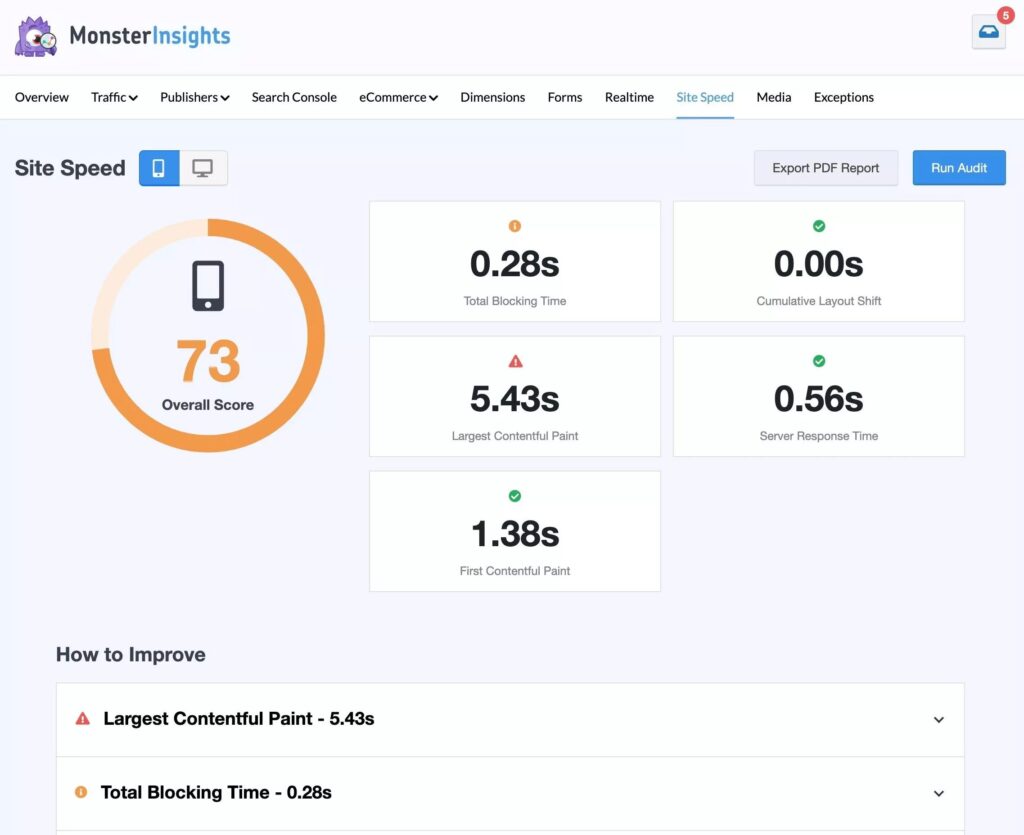
Also, check out How to Speed Up Your WordPress Site Performance: 17 Hacks
Create Clean HTML Structure
Many AI crawlers don’t handle JavaScript well, if at all. Logical content structure in plain HTML or markdown is ideal.
Best practices for AI-friendly HTML:
- Use semantic HTML5 tags (article, section, nav)
- Implement proper heading hierarchy (H1-H6)
- Include alt text for all images
- Use descriptive link text
- Ensure content is accessible without JavaScript
Read On-page SEO in WordPress: Your Complete Guide
Content Optimization for AI Search
Creating content that AI systems can easily understand and reference requires a different approach than traditional SEO writing.
Write for Direct Answers
AI search engines excel at providing immediate answers to user questions. Structure your content to make these answers easy to extract:
- Lead with the answer in the first paragraph
- Use clear, definitive language rather than hedging
- Include specific data and statistics
- Break down complex topics into digestible sections
Optimize Content Length and Depth
The average word count of pages ranking in voice search results is 2,312 words. AI systems favor comprehensive content that thoroughly covers topics.
Your content should:
- Cover topics comprehensively from multiple angles
- Include related subtopics and supporting information
- Provide context and background for better understanding
- Use examples and case studies to illustrate points
Structure Content for Scannability
AI systems need to quickly identify and extract key information. Use these formatting techniques:
- Short paragraphs (2-3 sentences maximum)
- Descriptive subheadings that summarize sections
- Numbered lists for step-by-step processes
- Bullet points for key takeaways
- Tables for comparisons and data
- Bold text to highlight important terms
Include Supporting Data
75% of marketers leverage AI to reduce the time spent on manual tasks like keyword research and meta-tag optimization. AI systems value content backed by credible statistics and research.
Always include:
- Recent statistics with source citations
- Research findings from authoritative sources
- Case studies and real-world examples
- Expert quotes and industry insights
Structured Data and Schema Markup
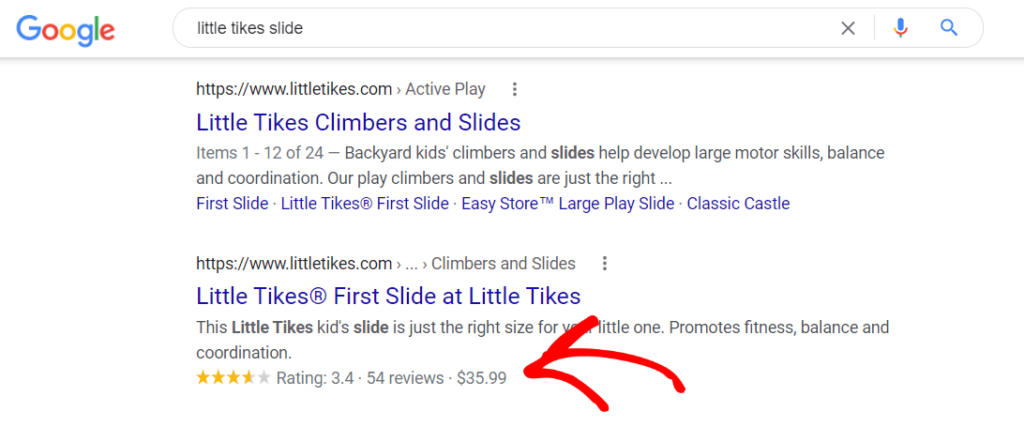
Research by Searchmetrics revealed that 36.6% of search keywords trigger at least one featured snippet derived from schema markup.
Schema markup is crucial for AI search optimization because it helps AI systems understand your content’s context and meaning.
Why Schema Markup Matters for AI
Users click on rich results 58% of the time compared to 41% for non-rich results, highlighting the effectiveness of structured data. This data shows why schema markup is essential for AI SEO success.
AI systems use schema markup to:
- Understand content context and relationships
- Extract specific data points like dates, prices, and ratings
- Categorize content types (articles, products, events, etc.)
- Generate rich snippets and enhanced search results
Check out our full guide on Schema Markup in WordPress: Let Me Simplify It For You
Most Important Schema Types for AI
Based on my analysis of AI search results, these schema types consistently perform well:
1. FAQ Schema
Perfect for question-based content that AI systems love to reference. Use this for:
- Customer support pages
- Help documentation
- Q&A sections
- Product information pages
2. How-To Schema
Ideal for step-by-step content that provides clear instructions:
- Tutorial content
- DIY guides
- Process explanations
- Technical instructions
3. Article Schema
Essential for long-form content and blog posts:
- Blog articles
- News content
- Research papers
- Case studies
Pro Tip: Always include author information, publication dates, and article descriptions in your Article schema to help AI systems understand content freshness and authority.
Implementing Schema Markup
I recommend using JSON-LD format for schema markup because it’s easier to implement and maintain. Here’s a basic example for Article schema:
json
{
"@context":"https://schema.org",
"@type":"Article",
"headline":"AI Search Engine Optimization Guide",
"author":{
"@type":"Person",
"name":"Your Name"
},
"datePublished":"2025-01-09",
"dateModified":"2025-01-09",
"description":"Complete guide to optimizing for AI search engines"
}Only 30% of online pages use Schema.org for markup, presenting an opportunity to stand out in search results. This means implementing schema markup gives you a significant competitive advantage.
To sum it up and make it a bit easier, here is a visual overview of essential schema types for AI search:
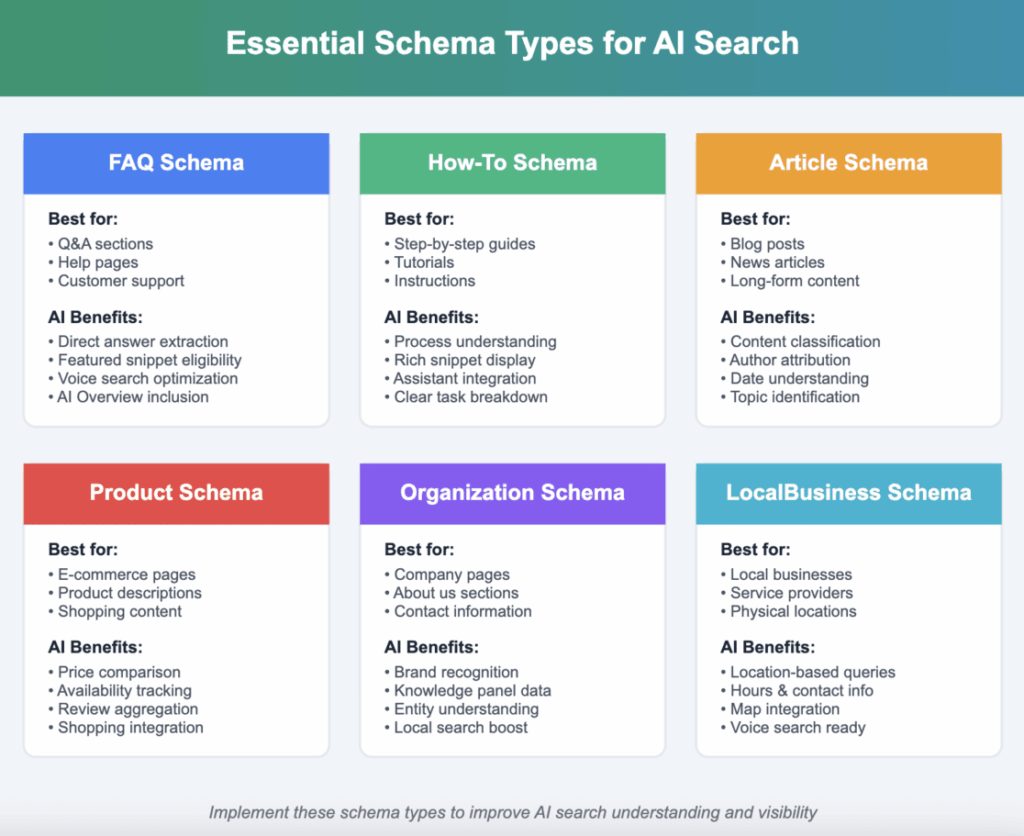
Measuring Your AI SEO Success
Tracking AI SEO performance requires different metrics than traditional SEO. Here’s how I monitor AI search visibility:
Key AI SEO Metrics to Track
AI Overview Appearances: AI Overviews take up 42% of the screen on desktop, 48% on mobile. Track how often your content appears in these results.
Featured Snippet Performance: Featured snippets have the highest clickthrough rate (CTR) at 42.9%. Monitor your featured snippet rankings closely.
Voice Search Traffic: More than 1 billion voice searches occur every month. Use Google Search Console to track voice search performance.
AI Citation Tracking: Monitor mentions of your brand or content in AI-generated responses, even without direct links.
Now, if you’re using WordPress, MonsterInsights can help you track many of these metrics directly in your dashboard with a few easy clicks!
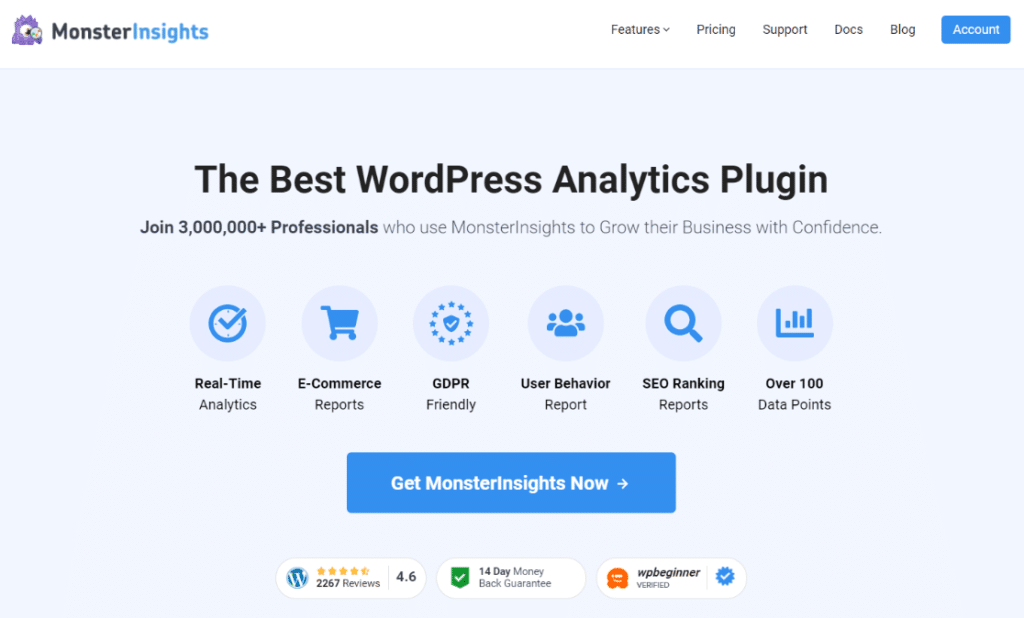
MonsterInsights is the best Google Analytics plugin for WordPress, and it’s perfect for monitoring your AI SEO performance. Instead of jumping between multiple tools and complex Google Analytics reports, you get clear, easy-to-understand reports right inside your WordPress dashboard.
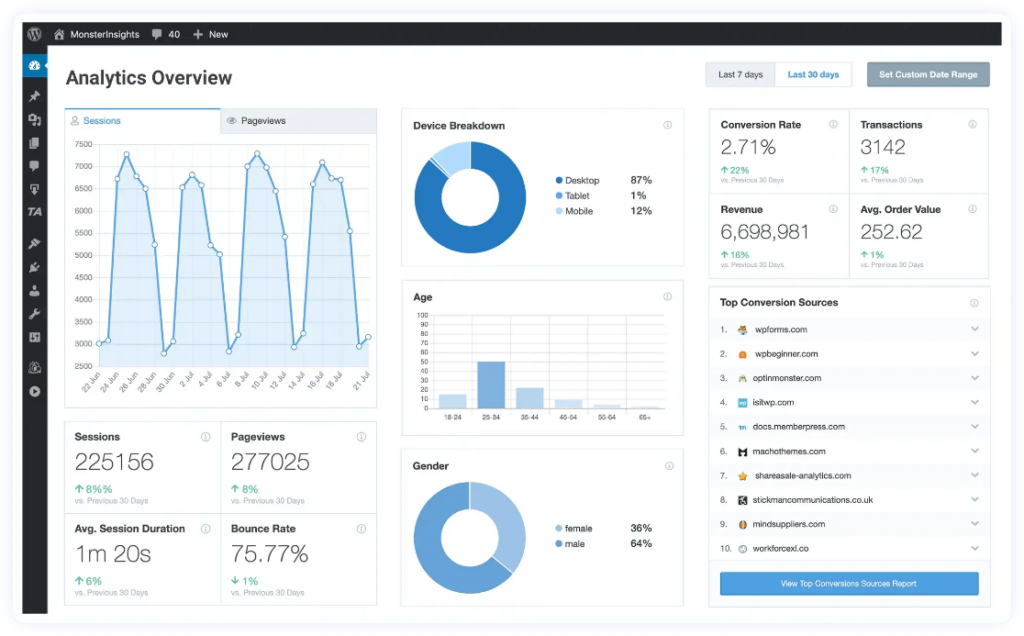
Plus, MonsterInsights makes it simple to set up advanced tracking features that are crucial for AI SEO success. With just a couple of clicks, you can enable:
- Form conversion tracking to see which search traffic fills out your contact forms
- Button click tracking to monitor engagement with your calls-to-action
- Video tracking to understand how users interact with your visual content
- eCommerce tracking to measure revenue from AI search traffic
- Author tracking to build the expertise signals AI systems value
And that’s it!
I hope you learned a lot from this AI search engine optimization guide. Be sure to check out these other resources:
AI Data Analytics: Full Guide for Better Business Decisions
The Biggest WordPress SEO Mistakes + How to Avoid Them
How to Increase SEO Rankings Quickly
How to Master SEO Search Intent to Improve Your Rankings
And don’t forget to follow us on Facebook and YouTube for more helpful Google Analytics and marketing tutorials.
Frequently Asked Questions
How do AI search engines differ from traditional search engines?
Traditional search engines match keywords to indexed pages and return lists of relevant links. AI search engines understand user intent and context, synthesize information from multiple sources, and provide direct answers with source citations. 88.1% of queries that trigger an AI Overview are informational, showing AI’s focus on providing immediate answers.
Do I need different content for AI SEO versus traditional SEO?
While the fundamentals remain the same, AI SEO requires more structured, comprehensive content. Content over 3,000 words wins 3x more traffic than average-length content. AI systems favor content that provides complete answers, includes supporting data, and uses clear formatting with headings, lists, and tables.
How important is schema markup for AI search?
Schema markup is crucial for AI SEO success. 36.6% of search keywords trigger at least one featured snippet derived from schema markup, and users click on rich results 58% of the time compared to 41% for non-rich results. Schema helps AI systems understand your content’s context and meaning.
Can AI-generated content rank in AI search results?
Yes, AI-generated content can rank in AI search results if it’s high-quality and provides value. 13.08% of top-performing Google content now consists of AI-generated content. The key is ensuring the content is accurate, well-researched, and properly optimized.
How do I track my AI SEO performance?
Track AI SEO performance using tools like Google Search Console for featured snippets, SE Ranking’s AI Results Tracker for AI Overviews, and Peec.ai for brand mentions across AI platforms. AI Overviews take up 42% of the screen on desktop, 48% on mobile, making tracking essential for understanding your visibility.
Should I block AI crawlers from my website?
Generally, no. You should allow AI search crawlers while potentially blocking AI training crawlers. Recent studies show that the search engine rankings of companies that leveraged AI in their SEO strategies improved 30% within 6 months. Configure your robots.txt to allow beneficial AI crawlers while blocking those you don’t want.
